A Matter of Life and Death
Pastor Michael Blog 29 Sep 2021 Michael Falzarano

“And to the angel of the church in Sardis write, ‘These things says He who has the seven Spirits of God and the seven stars: “I know your works, that you have a name that you are alive, but you are dead.”
After not attending church for decades, an elderly man started to attend regularly. But then, without warning, he vanished. The pastor investigated his sudden departure, only to discover that he was at the point of death. He had no life-threatening illness, so why was he in such a state? His son explained that his father had decided to stop eating and drinking. In quick order, he died. If Christians fail to partake of God’s word, if they fail to commune with Him at the fountain of prayer, then what?
We find the first-century church of Sardis in such peril. They may have looked okay externally, but they were actually dying a spiritual death. What was wrong? Jesus does not point to a specific sin or address any heresy or conflict in the church. Neither does He give them any commendation. The church had a vibrant and strong history, but one cannot live on past reputations. A good name doesn’t negate a rotting core. The problem was what they lacked.
Jesus approaches the church as the one who has “the seven Spirits of God”. This refers to the Holy Spirit and His full ministry to the seven churches. But to this church, Sardis, Jesus specifically addresses the Holy Spirit. Thus, we find their lack. They were dying for the want of the Spirit. “It is the Spirit who gives life” (John 6:63). Without which, a church will perish. Therefore, they needed the Holy Spirit to resuscitated them.
What was causing their death spiral? We learn much from their city’s history. Sardis was relatively secure, being a natural citadel due to its favourable geography. Still, twice before it had been captured. How? Due to overconfidence, it became carelessly guarded. The same happened to the Sardis church. It appears they had compromised with the world, which in turn benumbed their spirituality. Their overconfidence and spiritual neglect had lulled them into a slumber.
If we don’t safeguard our relationship with Christ, our life too will drain away. Therefore, Jesus calls the Sardis church to repent, to awaken to their dire condition. If not, His return would catch them by surprise. They were to wake up from their complacency and turn their hearts back to Him. They were urged to recapture the vibrant experience they once had with their saviour. Sardis is given promises if they do so. So are we! Not death, but eternal life. Not spiritual nakedness, but being fully clothed in Christ. Not refutation, rather Jesus will confess our names before the Father and the angels.
Therefore, don’t neglect the precious promises of God. If you’ve allowed your relationship with Christ to slip away, turn back to Him now. Don’t delay! Not for a moment. “Behold, now is the accepted time...” (2 Corinthians 6:2). Ask for the Holy Spirit to revive you and awaken your heart. Is it not a matter of life and death?
Image used by permission of SermonView
Fall On The Rock
Pastor Michael Blog 11 Sep 2021 Michael Falzarano
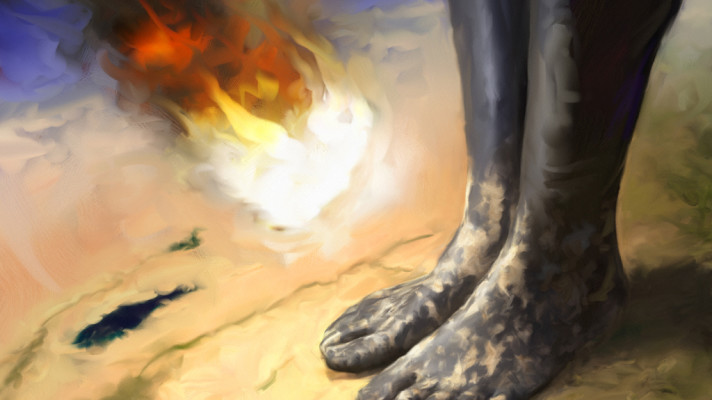
“Inasmuch as you saw that the stone was cut out of the mountain without hands, and that it broke in pieces the iron, the bronze, the clay, the silver, and the gold—the great God has made known to the king what will come to pass after this. The dream is certain, and its interpretation is sure.” (Daniel 2:45)
King Nebuchadnezzar had a remarkable dream that is recorded in the second chapter of Daniel. The king’s committee of mystics could not tell him what he dreamt. Finally, the Jewish captive Daniel was called in. God not only disclosed the king’s dream to him, but also gave him its interpretation. Daniel was a humble servant of God!
What was the king’s prophetic dream? It was of a human statue comprised of four metals, symbolising a succession of human empires. It started with a head of gold, representing Babylon. Next would come the Medo-Persian empire, represented by the chest and arms of sliver. After that, the Grecian empire would come, represented by the belly and thighs of bronze. This would be followed by the Roman empire, represented by the legs of iron. However, Rome too would fail, barbarian tribes would break it up into divisions. This was represented by the statue’s feet of iron and clay.
Therefore, the king was told, to his chagrin, that his kingdom would not last. Great was his territory, but it was temporary. In fact, the human kingdoms coming after it, no matter how vast or powerful, would be temporary as well. God “removes kings and raises up kings” (Daniel 2:22). God knows the future and holds the destiny of nations in his hands. As Christians, this should bring us much comfort.
In fact, a huge stone appeared in the king’s dream that smashes the statue, ending all human empires. This stone was “cut out without hands”. What does the rock represent? Christ and his kingdom (1 Corinthians 10:4; 1 Peter 2:4-6). When Jesus returns, the reign of earthly kingdoms will end. Jesus’ eternal kingdom will rule instead.
We should be comforted in this, because it shows that God is in full control. Although oppressive powers rise, they will not last, they will all fall. We should be comforted because we know how the flow of historical events end. Christ will triumphantly reign! How will you end up? It depends on whether you have fallen on the rock or not (Matthew 21:44)?
In Daniel 4:28-34, we find proud Nebuchadnezzar humbled by God. He fell on the rock and was broken of his pride and self-dependency. He ends up glorifying the Creator, where once he had exalted himself. However, his grandson’s pride failed to be broken and thus the rock fell on him (Daniel 5:18-22,30). Unfortunately, the pride that propels oppressive worldly kingdoms resides within each of us. Humbling and yielding ourselves to Christ, allows the Spirit to smash that internal fiefdom of self. Therefore, we each need to fall on the rock. Do so daily, that the worldly kingdom will pass you by.
Image used by permission of SermonView
Be Faithful!
Pastor Michael Blog 28 Aug 2021 Michael Falzarano
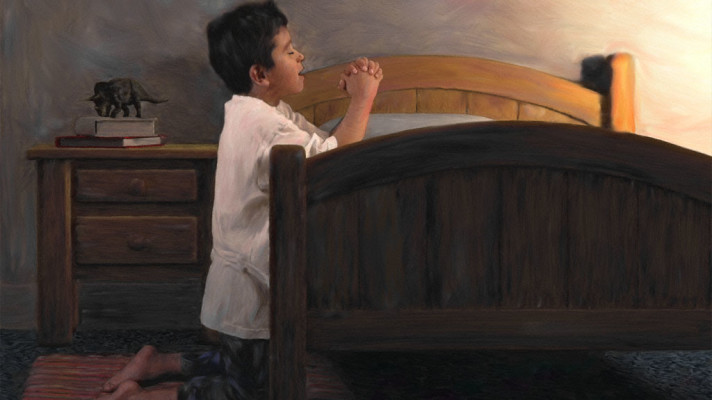
I know your works, and where you dwell, where Satan’s throne is. And you hold fast to My name, and did not deny My faith even in the days in which Antipas was My faithful martyr, who was killed among you, where Satan dwells. (Revelation 2:13)
A terrible neighbor brings terrible results. Unfortunately for the first century church in Pergamum, they suffered from not only a terrible neighbor but the most diabolical of all neighbors. Jesus tells them they lived, “where Satan dwells”. Satan’s throne was firmly rooted in their neighborhood. What does a throne designate? It represents authority and power, meaning Satan had a tremendous grip on their city.
Pergamum was a center of learning and medicine, but it was also a hotbed for pagan worship. There were multiple temples dedicated to Greek gods in Pergamum, such as Zeus and Asclepios. These two mythological gods bore the title of “savior”. Even more, the city was the epicenter for imperial worship. A citizen being required to offer some yearly incense and proclaim that “Caesar is Lord.” In return, one received a certificate proving compliance. This would have horrified the Christians there, as only Jesus was worthy of worship. He being the true and only Lord and Savior.
What did these Christians do? Did they flee the city? No! They were faithful, holding fast to the Lord. They did not deny Christ or their faith in Him. In fact, at least one church member, Antipas, was martyred because of his unrelenting faith.
However, there were false teachers in the church as well, who urged the members to compromise with the pagan world surrounding them (Revelation 2:14-15). Why risk your lives or livelihood over a few words or actions? Go along to get along. Be good neighbors. But what they were really seeking was for their brethren to compromise their faith in Christ. Due to this, Jesus comes to the church with the two-edged sword, emblematic of God’s word (Hebrews 4:12). It cuts away falsehood and restores the soul. The bible anchors the believer in eternal truth. They were not to trade God’s truth for a temporal and false sense of security.
These teachers were encouraging others to partake of the food sacrificed to idols. However, Jesus promised them the food of angels, God’s manna (Psalm 78:25). They were promised temporary safety, a certificate, if they bowed down to the emperor. Jesus offered them a white stone instead. The white stone gave access to festivals and provided special privileges. However, Jesus promised them access to the ultimate feast, the “marriage supper of the lamb” (Revelation 19:9).
Which is it? Compromise now for momentary security and gain, or be faithful to Christ and partake of eternity. If you’ve compromised God’s truth, if you’ve been unfaithful to Him, there is good news for you. If you give Jesus your failure, He will give you, His success. Open your heart wide and invite Him in. For the issue is not who is living around you, but who is living in you!
Image used by permission of SermonView
Is a Little Enough?
Pastor Michael Blog 22 Jun 2021 Michael Falzarano

“I know your works. See, I have set before you an open door, and no one can shut it; for you have a little strength, have kept My word, and have not denied My name” (Revelation 3:8).
Jesus spoke no rebuke to the Philadelphian church. Rather, He commends them for keeping His word, for not denying His name and for their endurance of faith. They listened to the Word and followed it, they held fast to the name of Christ, even when others were putting pressure on them to do otherwise, and their faith held firm through trials and adversity. Although they had a stellar faith, there was a weakness in the church. They only had a “little strength.” Is a little enough?
This congregation was likely small and its impact on their region minuscule. They had no prestige or wealth. They seemed outnumbered and overpowered by contrary forces. Therefore, Jesus comes to them as the holy and true one. His divinity shines forth to them, as does His ironclad faithfulness. This addressed their little strength, for no matter how small, insignificant or weak they were, their Lord was all powerful, and would faithfully supply their lack. Not only that, but Jesus comes to them as the one with the key of David. The one who opens doors, in which no other can shut. Therefore, what God needs from us is our faith, not our strength.
We think of Moses who had an ordinary staff in his hand. But with that staff, God did mighty things. Gideon had only a few pitchers and torches, and yet God wrought a great victory through them. A little boy had only five loaves and two fishes, yet Jesus fed well over five thousand people with them. We may get discouraged with the little we have, but we shouldn’t. Why? Because a little in the hand of God is much. So, don’t focus on your little! Rather, focus on the almightiness of Christ.
What door did He open? The door of heaven is one (Revelation 4:1). It is through this door that we have direct access to God’s audience and His great salvation. Jesus Himself being the door, who has opened the door of salvation through His atoning death, resurrection and ascension. He has the key of David, that is full access to the storehouse of heaven. In Him we have every spiritual blessing (Ephesians 1:3). And through this He opens doors for ministry and service, so we can bring the gospel to others.
The New Testament uses the language of opened doors to denote missionary opportunities (Acts 14:27; 1 Cor. 16:8-9; 2 Cor. 2:12; Col. 4:3). Christ opens such doors and will empower us to go through them. We, as a church or as an individual Christian, may feel weak and incapable of bringing the gospel to others. You may have little resources, or be in ill health, or are discouraged by others to participate in ministry. You may feel insignificant or ill equipped. Don’t be discouraged by such! Rather, put your trust in Christ and in His inexhaustible resources and power. If you do, your little will be much.
Image used by permission of SermonView
All Things To All
Pastor Michael Blog 16 Apr 2021 Michael Falzarano
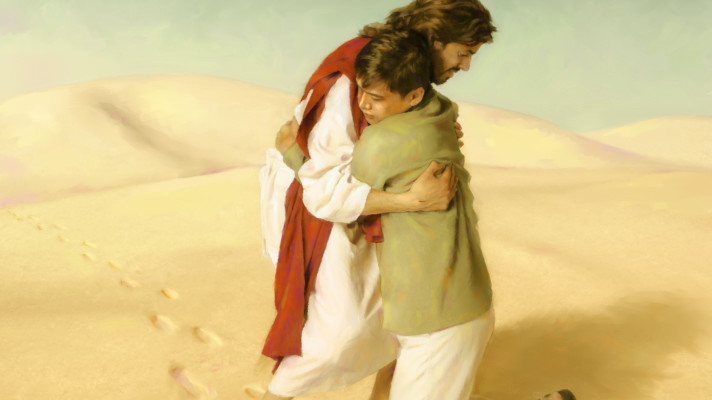
“I have become all things to all men, that I might, by all means, save some.” (1Cor. 9:22).
In chapter one of Revelation, Jesus is seen dressed as the high priest, ministering to the seven churches of Asia Minor. The churches are portrayed as lampstands, casting the light and brilliance of Christ into the dark world. It was the priest’s duty to maintain their light, least it wanes or goes out. This is reassuring for God’s children, as it means they have heaven’s undivided support.
However, each church has different challenges and weaknesses. Ephesus lacks their first love experience, Smyrna is fearful as it faces persecution, Pergamos has fallen into spiritual comprise, Laodicea is self-sufficient and blind to its spiritual lack, and so on. Therefore, each church is unique, which leads Jesus to appear to each one in a tailored fashion.
He comes to Ephesus as the one walking among the churches. They have left their first love, but Jesus assures them that He hasn’t left them. To Smyrna, He comes as the one who died but rose from death’s clutches. They are facing a martyr’s death, but even if this should be, Jesus has the ultimate say, for He can resurrect them. To Pergamos, He comes with the sword, the word of God. Why? To bring them from comprising back to the word of truth. Laodicea is the only church that had nothing positive said about it. So, Jesus comes to them as the source of creation. In creation, something incredible was made from nothing. He can do the same for them.
Therefore, Jesus meets each church where it is at, in their weakness and need. He encourages them to look to Him, so He can strengthen them and meet their need. And from this, we can learn much about how to approach others. The gospel shouldn’t be brought to others in a rote and clinical fashion, with a one size fits all mentality. Each person is an individual, with a particular background and struggles. To be the light of Christ, we must meet others where they are at, not where we think they should be. This is to say, we must meet them on their own turf, addressing them in a personal fashion. We are to commiserate with their challenges, and then point them to the remedy, their Saviour and all-sufficient high priest.
The apostle Paul did just that, “I have become all things to all men.” He identified with those he sought to win for Christ. He took into account their background, culture, experience, and struggles. He never comprised with the gospel message, but he was flexible in its means of delivery. To do so, one must suspend personal judgments and biases. In other words, like Paul, we must meet each where they individually stand. Then we can walk with them to level ground, that of the cross. And from it, we can elevate their hearts and minds upwards, towards the resurrected and ascended Christ.
Therefore, be inflexible with the word of truth, but adaptable with how you address it to others. That you “by all means might save some”. Meet others as Jesus met you.
Image used by permission of SermonView
What Transcends Fear?
Pastor Michael Blog 11 Apr 2021 Michael Falzarano

Do not fear any of those things which you are about to suffer… Be faithful until death, and I will give you the crown of life (Rev. 2:10,11).
After learning he had a terminal illness, the aged pastor expressed no fear of dying. However, he did dread the intense pain that might come before his departure. We were created to experience neither suffering nor death. It is sin that has brought these woes upon us and with them comes fear. The ultimate fear being that of death. However, we need not be afraid! Why? Because Jesus has freed “those who through fear of death were all their lifetime subject to bondage” (Heb. 2:14). Notice that fear brings bondage, but through Christ we are freed from its shackles.
In the first century, the church members at Smyrna faced imprisonment and intense persecution, even unto death. If any had a worthy reason to be afraid, it was they and apparently, they were! However, they had a high priest in the courts of heaven, who sympathised with them and their plight. Jesus suffered fierce persecution and travail on this earth. He became our sin bearer and took the punishment thereof. He experienced death, even the horridness of the second death. What is that? It is not the sleep of the first death, rather it’s the finality that total God abandonment will bring. However, Jesus promises the faithful Christians of Smyrna that they would receive not crowns of withered thorns but crowns of everlasting life. The second death would have NO power over them.
Notice the way Jesus presents Himself to this church. He comes to each of the seven churches in Revelation uniquely. That is, each church receives the same Jesus, yet each receives a different aspect of Him. Why? Because each church has unique needs or weaknesses. In Smyrna’s case He comes as the “First and the Last.” That is, He’s sovereign and in full control. As well, Jesus “was dead, but has come to life.” Therefore, they served a risen saviour who was triumphant over death and the grave (Revelation 1:18). Nothing would separate them from Him or His love, neither tribulation nor death (Romans 8:35-39). Therefore their fear, though understandable, was unwarranted!
Smyrna was a suffering church, afflicted and impoverished. Yet, from God’s perspective they were “spiritually rich” (James 2:5). They had faith and with it came every spiritual blessing in Christ. Therefore, there was no need to be afraid, even if their lives should be prematurely terminated. Their suffering would be only temporary, but their joy would be eternal. Smyrna, in the Greek, means sweet-smelling fragrance. Their witness would bear such fragrance as it was coupled to Christ’s faithfulness and sure promises.
What transcends fear? Love! God’s love transcends fear. “There is no fear in love; but perfect love casts out fear” (1 John 4:18). Are you fearful? Then place your trust firmly in God’s unshakable and everlasting love. If you do, your fear will be cast aside.
Image used by permission of SermonView
Separating and Filling
Pastor Michael Blog 16 Mar 2021 Michael Falzarano

"To you first, God, having raised up His Servant Jesus, sent Him to bless you, in turning away every one of you from your iniquities." Acts 3:26.
God created the heavens and earth in six days, through a process of separation and filling. We see this when we compare the first three days with the last three. On the first day God “separated” the light from the darkness, forming the day and night. Then on the fourth day He “filled” the day and night with the sun and moon respectively. On the second day God “separated” the waters from the waters, forming the sky and its atmosphere. Then on the fifth day he “filled” the sky with birds and the waters below with fish. On the third day God “separated” dry land from the waters and also created the vegetation. Then on the sixth day He “filled” the land with animals and mankind, who were sustained by the vegetation. Thus, a separating and a filling occurred.
The same with the seventh day, in which God rested from His work. He sanctified it for a sacred and intimate purpose, therefore “separating” it from the other six days. What did He “fill” it with? His divine presence. This to facilitate the relation of humans with himself.
And through God’s creative act, the man and woman became intimately entwined as one flesh in marriage. Note that man is to be “separated” from his parents and be joined to his wife. The two are designed to go forth as one and “fill” the earth with their offspring (Genesis 1:28; 2:24). Thus, a separating and a filling.
Likewise, the gospel is the recreative work of God. A person, once dead in sin, becomes spiritually alive and new in Christ (Ephesians 2:4-6). Is there a process of separation and filling in this? Absolutely! It is the way of God. We are to be “filled” with the Spirit (Ephesians 5:18). And Jesus will bless us by turning us away, “separating” us, from our iniquities (Acts 3:26).
It is incredible to be separated from that which is awful, but in itself this is incomplete. We are to be filled with something marvellous. God wants to “separate” us from our selfishness and “fill” us with His selfless love, to such an extent that it overflows liberally to others. The Spirit will do this in our lives. But we must be willing to be transformed. This takes a submissive heart on our part.
And there will come a time when God will fully recreate this sin marred earth. He will “separate” all tears, all sorrow, all pain, all sin and all death from it and from us (Revelation 21:1-4). These things will be no more, never to be found again. Instead, this world will be “filled” with an everlasting love and total purity. It will be filled with God’s glorious presence.
What thing needs to be separated from your life? Pray that it will be gone through the power of God. Pray that you are filled with the Spirit.
Image used by permission of Sermonview
Recapture the Flame
Pastor Michael Blog 21 Feb 2021 Michael Falzarano
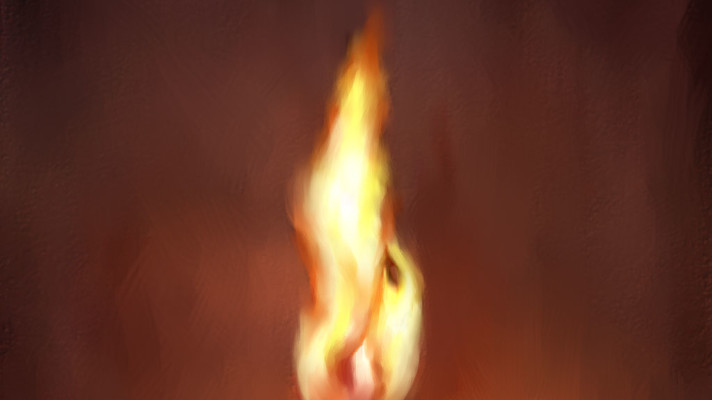
Nevertheless, I have this against you, that you have left your first love. (Revelation 2:4)
Have you ever met someone who appears to have it all together spiritually? They have many scriptures memorised and such flows eloquently from their tongues. They can preach, teach and employ God’s word, as efficiently as a samurai warrior could employ his sword. They not only can expose theological error with truth, but they also sacrifice time and personal treasure to build up the church. Ministry is their lifeblood. Nothing dissuades them from their duty and diligence, as a good soldier of Christ. But then you discover one day, with great alarm, that this person treats their family horribly. You discover a heartless indifference is lurking beneath their garb of spirituality.
The church at Ephesus became a spiritual titan in the first century. But something happened to it with the passing of time. From an external perspective, it was still spiritually vibrant. It had great endurance, no matter what pressure or attack came upon it; it flinched not from truth or duty. The church’s ministry was vigorous as it routed out evil and falsehood.
Yet Jesus tells it, “I have this against you, that you have left your first love”. He exposes their spiritual Achilles’ heel, their lack of heart! They had left their first love. They still had the mechanics of truth, but they were running without the fuel of Heaven. This was reflected in their human relationships. It is in these that the truth of our heart is most observable.
If we are lacking divine love, we are then, at best, operating on fumes. Therefore, Jesus admonishes Ephesus to repent and “do the first works”. When a marriage grows cold, it is needful to recapture the flame. It is therefore beneficial for the couple to retrace their steps, going back to the time they first fell in love. What attracted them to each other? What motivated them to focus their time and energy on the other? It is important to revitalise the relationship by doing what they did at first.
If your relationship with God has waned, then go back to His word and to the cross, contemplate His amazing love, mercy and compassion. Spend time with Him in prayer, take walks in nature and contemplate His majesty, power and grandeur. Spend time in fellowship with other believers, whose bright flame of love can help you to rekindle your own. Serve the hurting and needy. If we do such, the light of Christ can be recaptured and burn brightly once again. And our love for God will compel us to love others.
But you say the church you attend is cold and heartless! In fact, you are ready to flee from its chilly chambers. Would it not be better to bring your heater to it? First, rejuvenate your heart in the fervor of Christ’s love. Then He can use it to thaw the icy hearts around you.
Image used by permission of SermonView
Where Does Jesus Stand?
Pastor Michael Blog 06 Feb 2021 Michael Falzarano
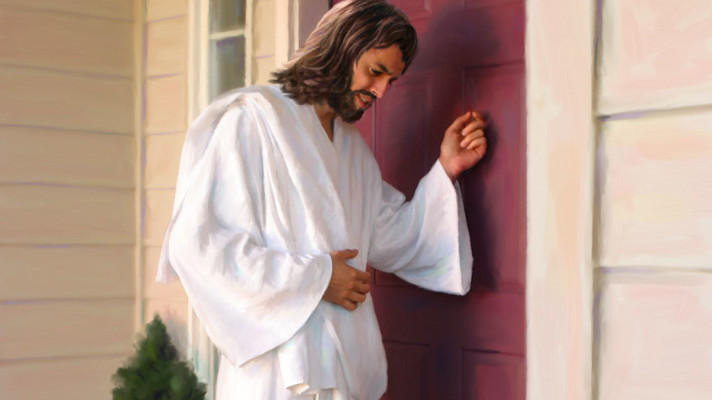
“Behold, I stand at the door and knock. If anyone hears My voice and opens the door, I will come in to him and dine with him, and he with Me.” (Revelation 3:20).
Of the seven churches in Revelation, the last church appears in the direst condition. This is due to their lack of spiritual acuity. Laodicea thinks of itself as being spiritual rich and therefore, in “need of nothing” (Revelation 3:17). The ill and needy came to Jesus for healing, sinners came for forgiveness. But here is a Christian church that comes not. Why? They are self-sufficient and self-deceived, oblivious to their true state.
Imagine meeting a destitute man who is homeless, without food or money, dressed in tattered and worn garments, filthy, dehydrated and emaciated. You have sympathy, so you ask if you can meet his need. But the destitute man is bewildered by such a suggestion. He insists he is rich, dressed immaculately, physically fit and abundantly fed. Such a response is delusional. So is Laodicea’s spiritual evaluation of itself.
However, Jesus pierces their façade with the word of truth. In reality they are wretched, miserable, poor, blind and naked. But He wants to heal them. He therefore offers them eye salve, that they may realize their great lack. He offers to clothed their spiritual nakedness with His purity. He offers them faith as tried gold, to replace their rusted alloy of smug self-trust. In essence, Jesus offers himself to them and with Him comes the panoply of heaven’s treasures. What do they need to do? Hear and believe His witness and word. They must open the door!
The core problem is where Jesus stands? He stands not in the church, but without her walls. Therefore, He is knocking, desiring entrance. But they have not responded due to their lukewarmness. Jesus does not force entrance, instead He lovingly knocks.
In the Song of Solomon, the Shulamite woman is comfortable beneath her blankets. She has finished the ritual of entering into her slumber (SOS 5:2-6). An unexpectant knock comes upon her door in the late evening. Who can it be? It is her true love! But her feet are washed and she doesn’t want to defile them on the dirt floor. She is dressed for sleep and in a cozy state. It would be much to answer the knock at such a late hour. So, she hesitates. By the time she shakes her sluggishness, her lover is no longer there. To find him now, she must go through great travail (SOS 5:7).
How about you? Where does Jesus stand? Is He outside your heart’s door, knocking? Is the lover of your soul seeking entrance? Have you unwittingly shut off the fellowship and healing that only He can bring? If so, shake off any self-satisfied slumber and awaken to your need! The true and faithful witness is exposing your true condition because He loves you (Revelation 3:19). So do not delay to answer the knock, as did the Shulamite woman. For her delay was costly.
Image used by Permission of Sermonview
Grace And Peace To You
Pastor Michael Blog 03 Jan 2021 Michael Falzarano
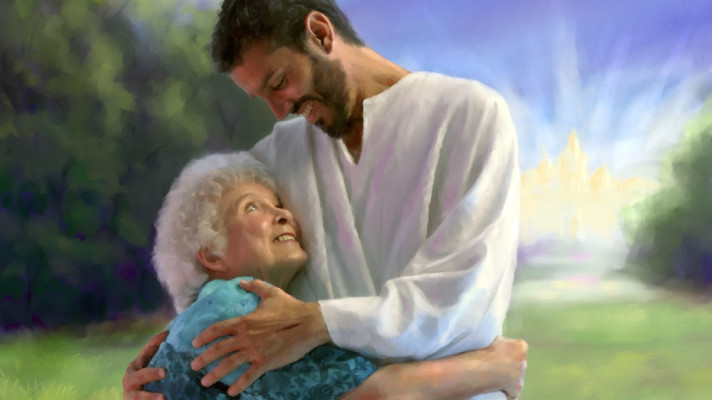
Grace and peace to you from him who is, and who was, and who is to come, and from the seven spirits before his throne, and from Jesus Christ, who is the faithful witness, the firstborn from the dead, and the ruler of the kings of the earth. To him who loves us and has freed us from our sins by his blood, and has made us to be a kingdom and priests … (Revelation 5:4-6, NIV)
A letter’s greeting tends to be rote and a mere formality. This is surely NOT true of the inspired letters in the New Testament. Even the greetings and salutations are pregnant with meaning and good news. Take for instance John’s greeting to the seven churches in Revelation. We are quickly greeted by God’s grace and peace! God’s grace is the undeserved and unmerited favor that He freely gives us. And if we truly receive it, then we will truly find peace.
Notice who is extending the greeting. The letter is from “Him who is and who was and who is to come,” that is the Ancient of Days, our heavenly Father. But it is also from the “seven spirits,” symbolizing the Holy Spirit and His seven-fold ministry. And it is from Jesus Christ. In other words, the whole godhead, in their complete oneness, wants to shower us with divine grace and peace. And such blessings are poured upon us through the ministry of Christ.
Notice that Jesus is called the “faithful witness”. He executed His mission upon earth faithfully and was a faithful witness to the Father’s character. In fact, the Greek word for “witness” is where we get the word “martyr” from. Therefore, Jesus was faithful unto death, even the death of the cross. The greeting also tells us why He was willing to sacrifice Himself for us. It is because He “loves” us. The word love is in the continuous tense. This means His love is a continuous stream that ceases NOT to flow. We may not sense it in the rough and tumultuous times, yet we can still be assured that it is so.
Jesus is also called “the firstborn from the dead.” This refers to His resurrection. He rose triumphantly from the grave and ascended to heaven’s throne. And through His death and resurrection, Jesus “freed” us from the tyranny of our sins. Having been raised to the throne, He became the “ruler over the kings of the earth.” And in so doing, He has made us to be a kingdom and priests.
Let this divine greeting soak in! It is incredibly good news. God is lavishing His love upon us. Through Christ’s sacrifice, we are delivered from our sins. We go from the status of sinners to become His chosen people, a royal priesthood. And what is the channel for such blessings? It is the all-sufficient ministry of Christ.
What should you do? Accept it! With humility and gratitude fully embrace it! To ignore it or reject it is NOT a viable option. Do not delay! Receive God’s gracious offer of grace and peace. And once received do NOT keep it to yourself. Be a faithful witness and share it with others. Is this not the priesthood He has called us to?
Image used by permission of SermonView
The Centrality Of The Cross
Pastor Michael Blog 14 Dec 2020 Michael Falzarano

And I looked, and behold, in the midst of the throne and of the four living creatures, and in the midst of the elders, stood a Lamb as though it had been slain…. (Revelation 5:6).
What’s in the centre of the cosmos? We find that It’s God’s throne (Revelation 4:1-5). The throne shows that God is in control and has the full right to govern all things. And as He created all things, He is therefore worthy of worship from all those He created. But there is more. At the centre of heaven, in the midst of the throne, we find a most curious thing! A lamb.
A LAMB? Why is such an unusual thing positioned at the most strategic place in the entire universe? And it’s no ordinary lamb at that. It was slain but is now alive, standing triumphantly. Why at the centre of all things? It’s simple. This lamb represents the essence of who God is and His awesome governess.
The lamb appears 29 times in Revelation. It is a gentle and submissive creature by nature. It was also the prime animal used for sacrifices in the temple services. It is the apt symbol of Jesus, who is meek and lowly, who became the lamb “slain” from the foundation of the earth (Revelation 13:8). What we have at the apex of the universe is this: The cross of Christ!
The centrality of the cross tells us much about God. It reveals that He is love and that such love is selfless, self-emptying and sacrificial. It also reveals that He is just! God did not discard His law or the consequences of its violation. The penalty had to be paid for justice to be fulfilled. But wonder beyond wonder, we see that it was God Himself who bore the penalty in Christ. And in doing so His mercy has been unleashed and lavished on us all. It is undeserved by us, to be sure, and yet it is so!
Although slain and buried, the good news is that Jesus did not remain in the tomb. He rose and ascended to heaven, triumphant over sin, death and the grave (Revelation 1:18; 2:8). And at Pentecost, our redeemer was inaugurated and installed as our great high priest. This is the scene we behold, with the Spirit being poured out into the whole Earth (Revelation 5:6). Therefore, the cross opened the spigot in which salvation freely flows to us. Through the blood of the lamb, we are redeemed, cleansed and freed from our sins (Revelation 1:5; 5:9; 7:14). And it’s through the blood of Christ that we shall be victorious (Revelation 12:11).
THINK OF IT! God revealed His power not through might but through weakness. The cross was a horrid thing: of physical, emotional and mental brutality, of shame and alienation. Although the cross was an instrument of weakness, it reveals the power of God’s selfless love. It is such power we may have if we receive it each day. DO SO! Pray that God will station the cross in the centre of your heart.
Image used by permission of SermonView
Rather Than Trying, Start Relying
Pastor Michael Blog 09 Oct 2020 Michael Falzarano

There remains therefore a rest for the people of God. For he who has entered His rest has himself also ceased from his works as God did from His. (Hebrews 4:9-10).
After creating the heavens and earth in six days, God rested on the seventh. Why? Was he tired? No! Unlike humans, God never grows weary or tires (Isaiah 40:28).
Rather, God rested on the seventh day because His work was finished (Genesis 2:1-3). Therefore, the seventh day is strongly identified with God’s rest. Adam was created on the sixth day, towards its end. This means his first full day of life was the seventh day. As it was impossible to contribute anything to God’s finished work, all Adam could do was rest in God’s work.
Such a rest is not merely physical; it’s spiritual. It comes to the soul who puts their full trust in God’s power and care. His power is that of creation, as well it is that of redemption. Redemption is needed because the first couple broke trust with their creator. In so doing, their rest was replaced with an inordinate burden of fear and guilt. Such then fell upon us, their descendants.
The good news is that Jesus provided atonement through His death, dying towards the end of the sixth day. This is no coincidence! Adam drew His first breath towards the end of the sixth day and Jesus, the last Adam, drew His last breath then as well. A final statement uttered by Christ on the cross was, “It is finished”. As God rested after His creation work, so did Jesus rest in the tomb after His earthly redemptive work was finished. In both cases the rest came on the seventh day.
Adam and Eve could in nowise contribute to God’s perfect work of creation; neither can we contribute to His perfect work of redemption. Therefore, we cannot obtain salvation through human effort or means; rather, we must fully rely on God’s work for us. That is, we are to enter His rest. We are to put our complete trust and dependency on His power through Christ to save us to the uttermost (Hebrews 7:25). The seventh day is an outward representation of this inward experience. It stands as a salient symbol of righteousness by faith. Does that mean we are not to work? Nay, the only one who can work righteousness is the one who has rested in the righteousness of Christ. Did not Adam go forth labouring in the garden after first resting on the seventh day?
“There remains therefore, a rest for the people of God.” The Greek word rest in this passage is sabbatismos and it means there remains a keeping of the Sabbath. By keeping the seventh day of the week as God intended, we witness our reliance on Christ’s power to both create and to save. But we must experience the spiritual repose behind the day. Are you restless, heavy-laden and burdened? (Matthew 11:28-30). There is only one remedy. Give yourself to Christ and enter His rest. Rather than trying, start relying!
Image used by permission of SermonView
Why Choose Rob?
Pastor Michael Blog 04 Oct 2020 Michael Falzarano
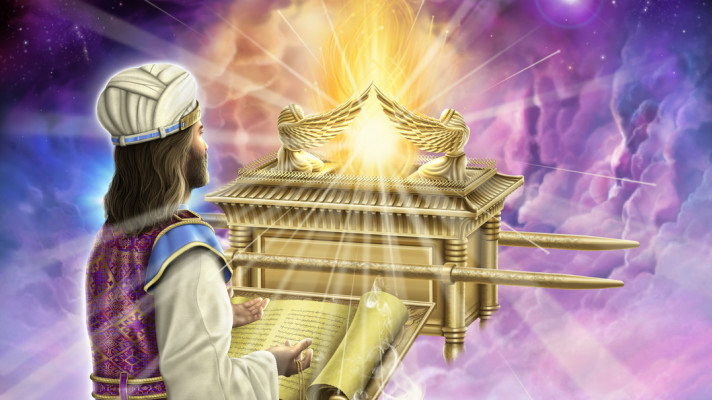
Now this is the main point of the things we are saying: We have such a High Priest, who is seated at the right hand of the throne of the Majesty in the heavens. (Hebrews 8:1)
If you need an advocate and have a choice between Rob and Charles, whom will you choose?
Rob knows the law’s requirements but has limited abilities. He is also expensive. Worse yet, Rob’s methods are antiquated. He is a centenarian after all. He is not all that accessible either. And Rob has scant sympathy for the needy. On the other hand, Charles is an energetic attorney with a proven record of success. He has sympathy for the downtrodden, having suffered great need himself. With Charles you get full access, anytime of the day or night at no charge.
Why choose Rob? There were Jewish Christians in the first century who did just that. Due to hardships, persecution and discouragement they were abandoning their faith in Christ’s priesthood and retreating back to the earthly temple’s priesthood (Rob). The writer of Hebrews passionately urges them to change course and put their full assurance into Christ. His heavenly priesthood is far superior to the terrestrial system that was passing away.
The temple economy had severe limitations. The priests were sinners and prone to death. They offered animal sacrifices repetitively, which had no power to save or remove guilt. Nor was it their design to do so. Rather, such sacrifices pointed sinners to Christ’s ultimate sacrifice, which does atone for sin. After His death, resurrection and ascension to the throne, Jesus was installed as our advocate, our great high priest.
Therefore, the inspired writer vigorously urges these Jewish Christians, to put their faith in Christ, not in human efforts or earthly systems. God’s word vigorously urges us to do likewise. Jesus will advocate our cause, refuting all charges hurled against us by the enemy. He sympathises with our struggles as well, as He too struggled against the flesh and was triumphant. Through the Spirit, Jesus will thus impart His victorious life to us on a daily and ongoing basis. The great news is that we have access to the throne of grace anytime, as our high priest is always available and accessible. Ours is to fix our eyes fully upon Him, “the author and finisher of our faith” (Hebrews 12:2).
When the battles of the flesh pounce, yield not the ground Christ has already won. Why choose Rob? One might find a temporal comfort in familiar and repetitive religious forms, but they can never provide what the soul truly needs. Only Christ can! We have the perfect high priest in the courts of heaven interceding for us, empowering us and bringing assurance to our soul. And “He is also able to save us to the uttermost” (Hebrews 7:25). We have far better than Charles; we have Jesus! Entrust yourself to Him fully, no matter what! And take heart, He never loses a case.
Image used by permission of SermonView
Firmly Planted
Pastor Michael Blog 19 Jul 2020 Michael Falzarano

I pray that, according to the riches of his glory, he may grant that you may be strengthened in your inner being with power through his Spirit, and that Christ may dwell in your hearts through faith, as you are being rooted and grounded in love. (Ephesians 3:16-17, NRSV)
Paul’s imprisonment would have caused the Ephesian Christians discouragement. If this mighty apostle of God ended up in such travail, what chance would they have? It is easy to be discouraged when we face the head winds of adversity. Paul understood this. So he prays that the Ephesians would be safely and immovably harbored in Christ. He prays they would be inwardly strengthened through the Spirit’s power. Why? So Christ might dwell in their hearts through faith. Wait! As Christians, didn’t the Spirit already indwell them?
One may “dwell” in a temporary place, an inn for example. A certain Greek word would denote that. But the Greek word Paul uses expresses a more permanent “dwelling,” such as one’s home. His prayer is that Christ would abide in their hearts permanently. He wants them to have an unwavering faith no matter what negative circumstances should befall them. For this to happen, their faith must be “rooted and grounded” in love. Deep roots make for a deep faith.
One may know the Bible and its prophecies cover to cover. One may know how to wax eloquently and grasp all mysteries. But as great as these may be, they will not forge a strong enough anchor. Comprehending the love of Christ will. In adverse times, we must know that we are cradled firmly in God’s arms. The conditions about us may be swirling, but we may know that God’s love is steadfast.
A ship was torn apart in a huge storm. The only survivor was a young lad who had been swept onto a large rock. He clung to that rock all night until he was rescued in the morning. A rescuer asked him if he trembled during his great ordeal. He replied that he did tremble, but the rock did not! Our feelings may get tossed to and fro by the battering waves of hostile circumstances, but Christ’s love is the rock we must firmly cling. No matter what comes our way, we must know that He loves us. And in due time will come for the rescue.
In the Amazon rainforest, trees store water underground in the rainy seasons due to their deep roots. Then, in the arid seasons, the trees endure by using the stored moisture to meet the need. So should we. In the peaceful times we need to store God’s blessings and promises deep within our hearts. We can then draw on them in difficult times.
Pray that you are deeply rooted in God’s love? And do grant Christ permanent residency in your heart.
Image used by permission of SermonView
The God Who Sees
Pastor Michael Blog 07 Jun 2020 Michael Falzarano

She gave this name to the LORD who spoke to her: "You are the God who sees me," for she said, "I have now seen the One who sees me." (Genesis 16:13, NIV)
Conflict can be a terrible thing. Hagar experienced it. She was the bondservant of Sarai, the wife of Abram. God promised Abram a child in his old age, even though his wife was also old and barren. As the promise was yet fulfilled, Sarai gave Hagar to Abram to be a surrogate mother. This was NOT God’s plan, but nonetheless Abram acquiesced and a child was conceived. But the situation caused much angst, disturbing any domestic peace.
Perhaps Sarai thought her misfortune was caused by Abram’s impotency. If so, such an idea was laid to rest when Hagar conceived. Jealousy and conflict arose. Hagar became haughty, showing her mistress contempt. In turn, Sarai treated Hagar abusively. Due to the subsequent oppression Hagar fled the camp, finding herself on a dessert road. What would she do? How would she survive?
Hagar was pregnant, alone, helpless and rudderless. Imagine her despair! And where could she turn for much needed support and encouragement? Hagar, in miraculous fashion, discovers that there is no wilderness barren of God’s love and kindness. We see this expressed in the names we find in this story.
Hagar’s name means, “flight”. She did that very thing, fleeing her troubling situation. Yet God, via the Angel of the Lord, swooped to her side. He lets her know in utmost tenderness that He is with her. Although not free from reproof, Hagar is told she will bear a son who will be greatly blessed. Hagar is told to name the son, “Ishmael”. Why? “Because the LORD has heard your affliction.” Ishmael means, “God hears”. God hears! His ears are turned toward our feeble cries. There He is, in our bleak dessert experiences.
Hagar has an encounter with the living God and is amazed she has survived it. She declares Him to be El-Roi, meaning “the God who sees me.” It is far more than physical sight, for God sees her affliction, her uncertainty, her struggle and alienation. He sees with His heart; He cares! With great mercy God encourages Hagar, promising to provide for her and her son. Through her child would come a tremendous heritage.
Have you fled into a wilderness to avoid a conflict or a trial? Do you feel alone, not knowing your next move? Do you need encouragement and direction? The living God hears the utterances of your heart! He is the God who sees you. He comes to give you hope and purpose. See not the dessert, but see the God who sees you.
Cast Your Net Before Him
Pastor Michael Blog 17 May 2020 Michael Falzarano

And He said to them, "Cast the net on the right side of the boat, and you will find some." So they cast, and now they were not able to draw it in because of the multitude of fish. (John 21:6)
After his resurrection, Jesus gave audience to the apostles a third time by the Sea of Tiberias. On this occasion, Peter and some other apostles had fished all night but came up empty. As day broke, they heard a voice from the shore telling them to cast their nets once again, but this time to the right side of the boat. Was this He, the risen Christ? No doubt, for their nets were miraculously filled.
So it is in life and ministry. To succeed we must cast our nets before Jesus. Peter learned this lesson painfully well. Not long before, on that chilly and dark night, he followed Jesus as He was led to His mock trial and execution. In the courtyard of the High Priest, Peter cowardly and brashly denied Jesus three times, as Jesus prophesied he would. When Peter realised the awful thing he had done, he wept bitterly in repentance. He had fallen on the rock of human failure; his courage and strength had utterly failed him.
It’s an odd thing how God uses broken vessels. We tend to discard them, deeming them to be unusable. But not God! It’s the very men and women who are broken that God uses the most. When Peter was self-sufficient, his heart was filled with pride. But when his pride was shattered he awoke to his terrific need, which lead him to depend on the power of the risen Christ. Peter had to cast his brokenness and fragility before God. It is such a net, one emptied of self-sufficiency, that the Spirit is able to abundantly fill.
Although Peter failed by denying his Lord, he would succeed now by fully relying upon Him. And so he did! Peter became a mighty man of faith, who walked fearlessly with Christ, even unto a martyr’s death. Multitudes were won to God’s kingdom through his ministry. The difference? In the first, he depended upon self to succeed and he crashed. In the latter, his trust was placed fully in God, not in himself. Peter found victory as his faulty engine of self-dependency was replaced by the Spirit’s all sufficiency. The result was a net brimming with God’s love and grace, which overflowed to many.
What should we do then, with our failure and brokenness? It’s simple! Give it to Jesus. By faith, cast your empty net before Him. And He will more than fill it.
Image used by permission of SermonView
As Christ Rose, So Shall We
Pastor Michael Blog 27 Apr 2020 Michael Falzarano
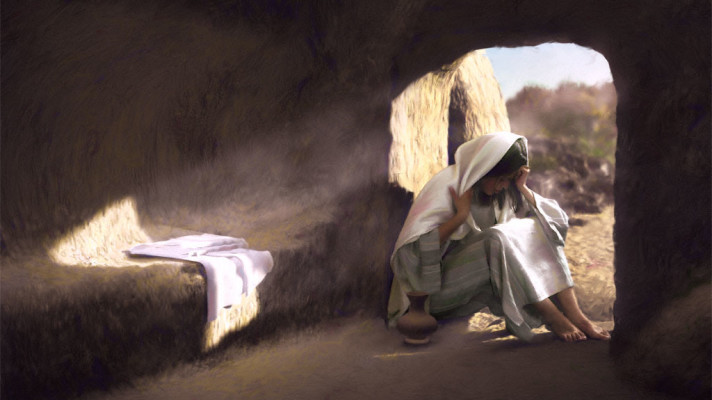
Now if Christ is preached that He has been raised from the dead, how do some among you say that there is no resurrection of the dead? 1 Corinthians 15:12
What if Jesus had not risen from the dead? An unimaginable thought! Yet Paul briefly entertains it, but only in order to teach the Corinthian church the truth of the resurrection. They had no doubt that Jesus rose from the dead, but some wrongly thought the believers who had died would not be resurrected.
Paul effectively vanquishes such a misconception by showing that the believer’s resurrection is inextricably linked to Jesus’ resurrection. If Jesus rose, then those who put their faith in Him would likewise rise. Therefore, saying that the righteous dead will not resurrect at the Second Advent is tantamount to saying that Jesus didn’t resurrect from the dead. What? How could that be? And what would it mean if it were true?
If Jesus didn’t rise from the dead then all Christian preaching would be futile and ring hollow. Our faith would be just as empty. Even more depressing, it would mean that those who died in Jesus have died in their sins. And we will suffer the same fate. That would mean that all we have is this temporal life, filled with brevity and burdens. In other words, if Christ did not rise then we have no hope of eternal life! No hope, none, not a strand! If so, perhaps we should just “eat and drink, for tomorrow we die.” And if Christ did not resurrect, then we who believe are to be the most pitied of all. Why? Because we would have shunned the earthly realm and the eternal one to come would be but a mirage. We would be like Don Quixote, tilting at windmills. Of course, this is only if Jesus had not risen!
Paul emphatically declares, “But now, Jesus has risen from the dead!” The inspired apostle moves beyond the harsh hypothetical to pronounce the verified truth. Jesus’ tomb is empty! The biblical prophecies were fulfilled to a tee. The risen Christ appeared to many, including over five hundred witnesses all at once. And the power of his resurrected life is on full display in the transformation of those who believe in Him. Therefore it is guaranteed, assured, certain, inevitable, that the righteous dead will resurrect and be bestowed with immortality. Therefore, let us “be steadfast, immovable, always abounding in the work of the Lord.” Why? Because as Christ rose, so shall we.
Image used by permission of SermonView
Live As He Did!
Pastor Michael Blog 09 Apr 2020 Michael Falzarano
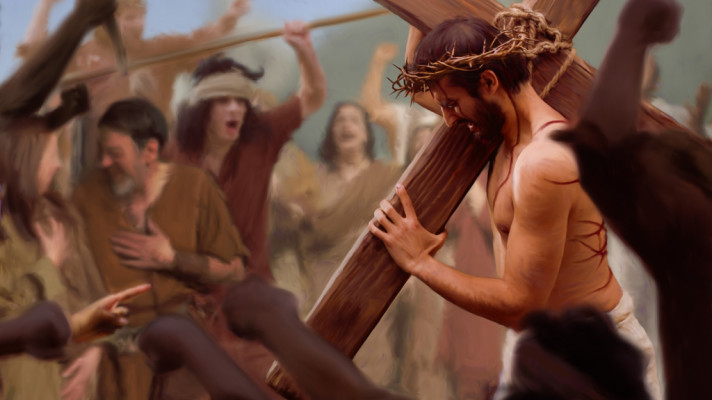
Who, when He was reviled, did not revile in return; when He suffered, He did not threaten, but committed Himself to Him who judges righteously; who Himself bore our sins in His own body on the tree, that we, having died to sins, might live for righteousness--by whose stripes you were healed. (1 Peter 2:23-24, NKJV)
Jesus bore our sins! It was not make-believe, not surreal nor pretend! Jesus really did bear our sins. And for that he was reviled, despised, slandered, maligned, smeared and libelled. Even though he was completely blameless. He knew no sin. Instead he only knew love, truth and righteousness. He was the innocent lamb led to the slaughter. However, He did not demand His rights nor declare his innocence.
His friends and followers forsook him. Judas betrayed him and Peter denied him. His own people turned against him. The religious elite falsely tried him. Rome’s soldiers beat and pommelled him without mercy. Into his flesh tore the metal barbs of their whip. The crown of twisted thorns brutally penetrated his brow. How greatly he bled!
He was tortured, disfigured and emaciated. He suffered a lack of sleep, a lack of food and water, a lack of love and kindness. And he was violently nailed to the tree. The spikes pounded through His hands and feet. With a horrific thud he and the cross were forcefully plunged into the ground. Nakedly suspended he hung between Heaven and Earth, as the sword of our guilt pierced through his heart.
Jesus was spit upon, humiliated and defiled. He was mocked and taunted by the wild pack of unrestrained humanity beneath his feet. Yet, Jesus did not revile back. He did not curse those who hung him out to die. He did not retaliate or curse his enemies. Instead he forgave us and died for us.
To believe in Jesus is to commit ourselves to him. It is to leave all and follow him. It is to leave behind resentment, ill feeling, vengefulness, bitterness, prejudice, hatred, unforgiveness and the like. It is to hang such things on the cross, as he did, instead of hanging them in our hearts. We are healed by his stripes. Therefore, let us live as he did.
Image used by permission of SermonView
Feet Of Faith
Pastor Michael Blog 08 Mar 2020 Michael Falzarano

And Abraham said, "My son, God will provide for Himself the lamb for a burnt offering." So the two of them went together (Genesis 22:8).
Abraham started on a long walk early one morning. By God's instruction, he was traveling to Mount Moriah to sacrifice his son of promise. Isaac was born miraculously to him and his barren wife in their old age. Through Isaac would come not only a mighty nation, but also the Messiah. Therefore, to sacrifice Isaac not only meant death to his beloved son, but also to God’s promise of salvation. Yet Abraham had explicit faith in God’s word. Such faith lead him to act upon it.
After three days of travel, the party rested with the mountain in sight. Abraham instructs his two servants to stay, as he and Isaac would go onward to the destination to worship. Abraham assured the servants that both he and Isaac would return to them. Didn’t Abraham think his son would be killed? Yes, but Abraham figured God could then raise Isaac from the dead (Hebrews 11:17-19). He had no doubt that one way or another God would fulfil His word!
And what of Isaac’s faith? He was a young man at this point, so he could easily resist his aged Father. Instead he carried the wood for the burnt offering. But he did ask his father where the offering was. However, at some point Isaac came to the realisation that he would be the offering! Yet he still went to the altar. What a picture of Jesus, who willingly carried the wood in which he would be crucified (John 19:16–18). Abraham’s ordeal was an incredible glimpse into the cross.
Faith can’t exist only in the mind and heart, for “faith without works is dead” (James 2:20, 26). Abraham didn’t say, “I believe” and then stay at the mountain’s base. Rather, he had feet of faith which scaled that mountain. His hands of faith strapped Isaac to the altar. His arm was raised in faith in order to slay Isaac. His faith had actions and his actions showed that he held nothing back from His Lord.
However, God stayed Abraham's arm least he hurt his son. It was not Abraham’s son that would be slayed but His own. God would provide the sacrifice, the ram caught in the thicket. It represented the Messiah to come. A crown of thorns would be thrust on his head. Nails would be thrust through his hands and feet. A spear thrust into his side. Worse of all, Jesus would be severed from His divine Father. He would bear our sin and our punishment. On this mountain, Mount Moriah, Jesus would be crucified. Abraham longed to see that day, and “he saw it and was glad” (John 8:56).
Have you walked up that mountain? Is there anything holding you back from doing so? If so, let go of it and trod the path God lays before you in faith. Like Abraham, hold nothing back. And be assured, God will fulfil the plans He has for you. Believe not only with your heart and mind, but also with your feet.
Image used by permission of SermonView
Better Than The Angels
Pastor Michael Blog 25 Nov 2019 Michael Falzarano

If we reduce the book of Hebrews to one word, that word would be “better.” We are told Jesus is better than Moses and Joshua; He is a better high priest than the earthly ones and so on. In the first chapter Jesus is shown to be “better than the angels” (Hebrews 1:4).
Angels are created beings, powerful and majestic, yet Jesus is far better than they, as He laid the very foundations of the earth, and all things were created through Him (Hebrews 1:2, 10; Colossians 1:16). He is changeless and eternal, being the “exact” representation of God’s nature. It is Jesus, not the angels, who share God’s name, a better name than they have, for He is God’s son (Hebrews 1:3-5).
The Angels are ministering spirits. They aid us who are the inheritors of salvation (Hebrews 1:14). But Jesus is the very one who gives us salvation through his perfect life, atoning death and resurrection. After which, Jesus ascended to the right of the “Majesty on high” (Hebrews 1:3, 13). There is no place higher than heaven’s throne, and it is the place Jesus sits.
So it is clear the angels are inferior to Jesus. This is also shown in the fact that they worship him (Hebrews 1:6). The apostle John was so dazzled by an angel’s brilliance that he fell prostrate before him. But the angel sharply rebuked John for trying to worship him, as worship is reserved ONLY for God (Revelation 19:10; 22:8, 9). By worshipping Jesus, the angels clearly declare His divinity.
But it is not only the angels that declare this. God the Father says it is so. The Father says of the Son, “Your throne, O God, is forever and ever” (Hebrews 1:8, 9). God, the Father, in no uncertain terms calls his Son “God.”
And yet it was from this vaulted position, that Jesus descended. He emptied himself of his divine rights to take on human nature, to become a little lower than the angels (Hebrews 2:9). That showed extraordinary humility. But Jesus went even lower. In taking on our humanity, He subjected himself to death, even to the death and shame of the cross (Philippines 2:5-8). He, who knew no sin, willingly bore our sin, guilt, and judgment. He therefore made purification for all our sin. Because of Jesus we have forgiveness, redemption and eternal life.
Is Jesus worthy of worship? The angels say yes! What say you?
The Acceptance Of Worship
Pastor Michael Blog 24 Nov 2019 Michael Falzarano

For this is the message that ye heard from the beginning, that we should love one another. Not as Cain, who was of that wicked one, and slew his brother. And wherefore slew he him? Because his own works were evil, and his brother's righteous. (1 John 3:11-12, KJV)
The human heart craves acceptance. The highest and greatest acceptance we can receive is that of God’s. And when we accept God and embrace His acceptance of us, it will cause us to accept and embrace our brethren. Cain and Abel are a case in point.
They both worshipped God, bringing offerings before Him (Genesis 4:3-5). It is not a stretch to say they both wanted God’s acceptance. However, the two brothers sought it in contrasting ways. Cain was a farmer and from his crop he brought his offerings. Abel was a shepherd and brought choice offerings from his flock. Cain’s offering was rejected, while his brother’s was accepted. Why?
Abel brought an animal sacrifice, showing his recognition of sin and its solution. It pointed to the Christ to come, who would take away the sin of the world (John 1:29). However, Cain’s offering was bloodless (Lev. 17:11; Heb. 9:22). He felt he would be accepted based on the fruit he himself produced. So it appears Cain failed to recognise his sin and his need of a Savior. We see this reflected in his anger when his offering was not accepted.
To silence Abel’s righteous witness, Cain murdered him. His rage and jealousy lead him to do so. This proves that Cain had rejected God’s grace and acceptance. For God’s grace received is God’s grace revealed. We know that we have passed from death unto life, because we love the brethren (1John 3:14).
God previously told Cain that “sin lieth at the door” (Genesis 4:7). Many interrupt this to mean sin is like a wild beast ready to pounce. But there is an alternative view. The Hebrew word for sin here is frequently translated as “sin offering” in the Old Testament. Could it be that God was telling Cain the “sin offering” was at his door, still available for him to bring? Offer it with repentance, as did Abel, and it would surely be accepted. By doing so, Cain, the firstborn, would also gain the lost respect of his younger brother. However, instead of showing contrition, Cain hardened his heart against God and his brother. He rejected God’s offering. The blood of Abel testifies to this (Genesis 4:10).
God has already accepted us in Christ. Have you accepted His acceptance? If so, you will bring the right offering to God in worship, not human works but the merits of Christ. And if you are truly putting your faith in Christ, it will show. Instead of slaying your brethren with words and deeds, you will show your love for them.
Used by permission of SermonView
The Centrality Of Worship
Pastor Michael Blog 03 Nov 2019 Michael Falzarano

And every creature which is in heaven and on the earth and under the earth and such as are in the sea, and all that are in them, I heard saying: "Blessing and honor and glory and power Be to Him who sits on the throne, And to the Lamb, forever and ever!" (Revelation 5:13, NKJV)
What is the centrality of worship? During Medieval times it was the altar, where the mass became the central focus. The Protestant reformation instead elevated the pulpit, making it the central focus. In modern times, there are many churches in which the praise band is central. Which should it be: the altar, the pulpit or the band? The answer is none of these. Rather, the central focus of worship should be the throne!
The word “throne” appears 12 times in Revelation 4, and it’s central to all events. John describes it in breathtaking fashion; it is absolutely glorious. Of course it’s not the throne itself, but the one who reigns from it that makes it so glorious. In congregational worship then, it is not the preacher, musicians, singers or any other who should take central place, but only God and His throne.
Why should we go to church to worship? We should not go so we can receive something from God! To do so puts us at the centrality of worship, not God. We do receive blessings from worshipping God. However, this is not the purpose of worship. Worship is about giving not getting. What can we give to God, who has everything? The angels, four living creatures and twenty-four elders in Revelation 4 show us the answer. They give jubilant praise to God!
What do they praise God for? For His divine being and His mighty works. They acclaim His eternalness, holiness and might. They shower Him with adoration because He is the Creator of all things. God not only created all things, but He also sustains all things through His power. “For in Him we live and move and have our being” (Acts 17:2).
Only God is God and only He can ever be God. Therefore, God alone is worthy of worship.
There is more! In Revelation 5 we find the heavenly host worshipping around the throne again. A scroll needs to be unsealed, least fallen mankind perishes. There is none found worthy to open it, until John sees a lamb at throne’s center. The lamb had been slain, representing Jesus’ atoning death on the cross. The lamb is now standing, representing His victorious resurrection, ascension and inauguration as our high priest. The lamb is equally worthy of praise and worship, as is the Father. Worship should extoll their being and mighty acts of creation and redemption.
God reigns from the throne and is in full control. The question is does He reign in our hearts? Have you given Him full control over your life? To do so is the centrality of worship.
Image used by permission of SermonView
The Attitude Of Worship
Pastor Michael Blog 18 Oct 2019 Michael Falzarano
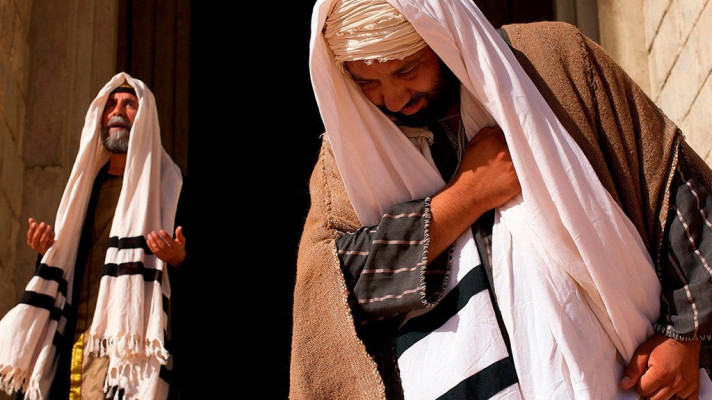
Two men went up to the temple to pray, one a Pharisee and the other a tax collector. (Luke 18:10)
Body language communicates as much as spoken words do. So it does with these two men who came into the temple to worship. One, a publican, stood far off in lowly fashion. The other, a Pharisee, stood in a more prominent place. The publican’s stance reflected his contrition. He stood beating his breast, unable to look upwards towards heaven. The Pharisee stood erect and firm, exalting self-confidence.
Pharisees were religious leaders, influential and esteemed in Jewish society. They were guardians of God’s law, meticulous in their observance of it. On the other hand, publicans were despised. As tax collectors, they were subcontractors for the Roman Empire. Therefore, they were yoked with an occupying nation that was pagan and oppressive. Publicans derived a handsome income by extorting excessive taxes from their fellow Jews.
Therefore, this Pharisee stands proud before God, self-satisfied and secure in his own virtue. He eyes this publican standing far off with disdain. An air of righteousness encases this religious leader’s high opinion of himself. He points God to his good works and righteousness, “I fast twice a week; I give tithes of all that I possess’ (Luke 18:12). Juxtaposed to him stands the publican, self identified as “the sinner” (Luke 18:13). This man looks at no one else; rather, he sees only his own shortcomings. He doesn’t bring a resume of righteous deeds to God like the Pharisee, for he has nothing of merit to offer. All he can do is what he does do. He humbly pleas to God for mercy!
This worship event would have taken place at either the time of the morning or evening sacrifice. Upon this sacrifice the tax collector pinned all of his hope. The slain animal represented the sacrifice of the spotless lamb, the Christ, who gave himself for the sin of the world (John 1:29). It is only through His merits and great sacrifice that the publican could cry out to God for mercy. By doing so, this sinner became justified. He was declared to be righteous and in right standing with God.
The original audience of this parable would have marvelled at the tax collector being justified and not the Pharisee (Luke 18:14). But if we know our need and the awesome grace of God, it could be no other way. Salvation is based not on our works but on the atoning work of Christ. It is a gift that we deserve not. Yet in order to receive it, we need such a contrite heart as this publican. We need a childlike faith in God, to trust Him fully and to fully depend on His salvation (Luke 18:15-17). To do so is the only reasonable course. To do so is to have the proper attitude of worship.
Image used by permission of LumoProject
Carrying Those In Need
Pastor Michael Blog 15 Sep 2019 Michael Falzarano
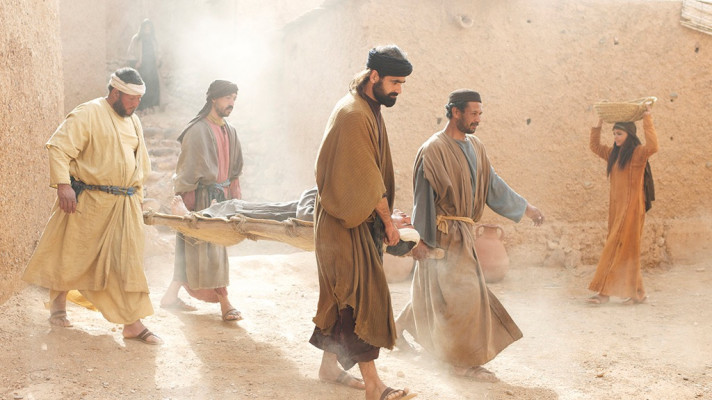
Then they came to Him, bringing a paralytic who was carried by four men. And when they could not come near Him because of the crowd, they uncovered the roof where He was. So when they had broken through, they let down the bed on which the paralytic was lying. (Mark 2:3-4, NKJV)
True friends give their support in the time of need. This paralytic was in dire need. His condition was impossible to overcome. He was physically paralysed and no doctor could afford him help. Atop of his physical need laid a great spiritual need. He therefore sought not only liberation of body, but also of mind and soul. Yet, he was immobilised by guilt and sin.
This paralytic’s only hope was Jesus. But how could he get to Jesus in his state of paralysis? He was confined to his bed! His four friends provided the answer. They would lift him; they would carry him and his burdens; and they would bring him to the feet of Jesus. Only Jesus could heal him, but they would be the vehicles used to transport their friend to Jesus. Their love for their crippled friend was obvious, as was their strong faith in Christ.
Jesus was teaching in a home in Capernaum, most likely Peter’s home (Mark 1:29). The house was full with those seeking to hear Him, even blocking the entrance. This proved to be a huge obstacle for them and their heavy load. However, they were determined to fully support their friend. So they came from above, having made a hole in the roof. Through this they lowered him, bed and all, to Jesus’ feet. This took effort and care. But it was the least they could do and it was the best they could do. They proceeded without complaint.
Jesus first addressed the crippled man’s greatest need. He extended to him divine forgiveness, thus freeing him from his shackle of guilt (Mark 2:5). To show He bore divine authority to do so, He next told him to “rise” and “walk” (verses 9-11). The paralytic responded to Jesus’ command. He was now restored both physically and spiritually. It was the power of God that healed him. But what if he didn’t have four faithful friends?
True friends give their support in the time of need. There are those we may know who are shackled by guilt or trauma. They are so immobilised they cannot on their own accord come to Jesus, even if they desire to do so. They need assistance from faithful Christian friends who can carried them. No obstacle should hinder or dissuade from such an important duty. As Christians we are to aid those in need in practical ways and encourage them with God’s promises. Our ultimate goal is to bring them to the feet of Jesus. Persistant prayer is our best vehicle to do this. It is the least we should do and it is the best we can do.
Image used by permission of LumoProject
The Wedding Garment
Pastor Michael Blog 04 Aug 2019 Michael Falzarano
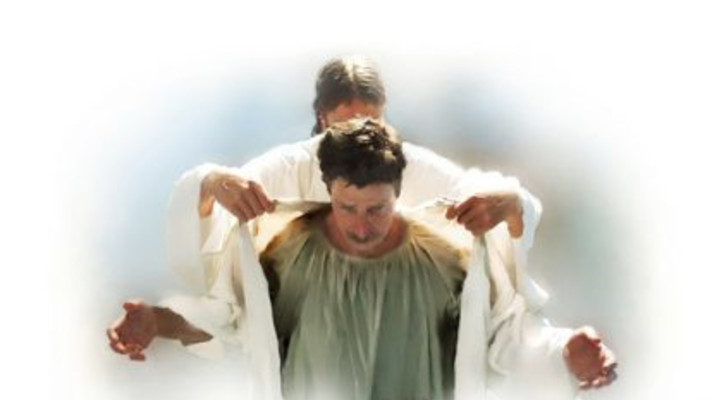
But when the king came in to see the guests, he saw a man there who did not have on a wedding garment. So he said to him, 'Friend, how did you come in here without a wedding garment?' And he was speechless. (Matthew 22:11-12, NKJV)
A king arranged a wedding for his son. The wedding feast was integral to this and it was to be extravagant. At great personal expense the king had readied everything. All that was needed were guests to join in the celebration. So the king sent his servants to gather them. In coming, they would honour the king and be themselves blessed. However, to the king’s amazement the initial ones invited refused to come. They made “light” of the invitation; the wedding feast was not worthy of their time. They had other priorities.
And so it may be with you. Eternal life can be obscured by the everyday routines of life. But take note. God has arranged a banquet and all is ready. Jesus, God’s son, took on human flesh and became wedded to humanity. He wrought out salvation through His perfect life, sacrificial death and glorious resurrection. Everything is prepared. Through Christ, we are accepted into the family of God.
In the parable, those invited turned against the king and treated his servants horrifically. Yet the king did not give up. He sent his servants to the highways to invite both the good and bad. The Lord is longsuffering not wanting any to be lost (2 Peter 3:9). His invitation went to all. And many did accept it.
During the feast the king inspects these guests. One stands out like a sore thumb. He is not wearing the wedding garment, but his everyday clothes. The wedding garment represents a righteous character (Isaiah 61:10). However our natural garments are “as filthy rags” (Isaiah 64:5). Therefore, God invites us each to accept Jesus’ righteous life to be ours. This is what justifies us.
But there is more! We are to not only accept the invitation but are also to wear the provided garment. This is what sanctifies us, the putting on of Christ daily. By faith we are to daily receive the Holy Spirit’s power. In so doing, His fruit will give evidence of our connection to Christ (Galatians 5:22, 23). However, this man was speechless upon the king’s inquiry. He knew his deep wrong by refusing to wear the king’s provision. The results of which were dire. Though many accept the gospel invitation, not all of them accept its transformational power. They are self-sufficient and end up being none the better for it.
Jesus stands at the door of our hearts, seeking entrance (Revelation 3:20). Do allow him access! Recognise your need and by faith put on His righteous life daily. Rejoice in the salvation He has given you. Your praise for Him will become your eternal song. Upon inquiry, you will not be speechless.
Image used by permission of SermonView